Amnesia: The Dark Descent – Review
by Lorna
|
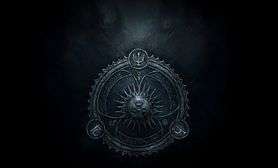 When it comes to horror adventures, Swedish developer, Frictional Games have a good pedigree. Their three part horror series, Penumbra, remains high on horror aficionados’ lists, bringing with it a smart ability which allowed players to directly manipulate objects in a realistic way. Now, nearly three years later, the small team have quietly unleashed Amnesia: The Dark Descent, a game which has gathered word of mouth momentum, thanks to its lethal ability to scare the living daylights out of most jaded PC gamers who play it and, to be honest, it is hardly surprising.
When it comes to horror adventures, Swedish developer, Frictional Games have a good pedigree. Their three part horror series, Penumbra, remains high on horror aficionados’ lists, bringing with it a smart ability which allowed players to directly manipulate objects in a realistic way. Now, nearly three years later, the small team have quietly unleashed Amnesia: The Dark Descent, a game which has gathered word of mouth momentum, thanks to its lethal ability to scare the living daylights out of most jaded PC gamers who play it and, to be honest, it is hardly surprising.
Set in the brooding forests of Brennenburg, East Prussia, the player assumes the role of Daniel, an Englishman who wakes up inside an apparently deserted castle with no memory of how he got there. Before lips purse at the staple, amnesia storyline, it is integral to the game, not as a hackneyed plot device, but, rather, as a way of heightening tension, paying out a carefully paced string of horrors as Daniel’s past and the nature of his stay in Brennenburg Castle slowly unfolds with the story. Discovering a note from his past self, Daniel’s task is to find and kill a man named Alexander, though for what reason, we are not yet told. With this odd, but seemingly simple directive, so begins your exploration and descent through the castle and into the depths, unveiling the fog of Daniel’s story as you go.
This, however, is a horror adventure, so you can bet your britches it won’t be as simple as nipping downstairs and dispatching our mysterious Baron with a clean sweep of a sword. From the outset, the castle is infused with a silent menace, a sort of expectant horror which only gets worse as the game drives you onward. I’ll get it out of the way early and state that to say Amnesia is scary would be a gross understatement. I typically avoid horror titles, however, in deciding to give this game a try, I threw myself so far in the deep end that I have barely, now, got my breath back. Frictional Games have set a new bar with regards to horror, far surpassing cheap scares and over-reliance on gore to conjure tension and atmosphere. No, Amnesia is smart and the whole game is engineered to force players through the wringer, deftly manipulating their senses and emotions to generate a thick atmosphere of tension which rarely strays from a knife edge of fear.
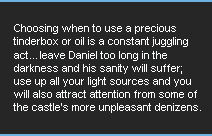 Rather than using them as core themes, Frictional have employed light and darkness as the very fabric of the gameplay, using it to sustain the constant nerve jangling tension. Daniel will swiftly come to be utterly dependant on light sources to find his way around the castle and maintain his fragile sanity. Yes, you don’t just have health to worry about, but, given the bizarre nature of his circumstances and the eerie surrounds in which he finds himself, Daniel’s sanity plays a large part in the game and must be monitored carefully.
Rather than using them as core themes, Frictional have employed light and darkness as the very fabric of the gameplay, using it to sustain the constant nerve jangling tension. Daniel will swiftly come to be utterly dependant on light sources to find his way around the castle and maintain his fragile sanity. Yes, you don’t just have health to worry about, but, given the bizarre nature of his circumstances and the eerie surrounds in which he finds himself, Daniel’s sanity plays a large part in the game and must be monitored carefully.
Being in the darkness for even a few moments will begin to fray Daniel’s mind, something which doesn’t bode well. Leave him too long without light and the screen will blur and waver, controls will become sluggish, and, in a brilliant move by the developers, his perception of the world around him alters and distorts, making an already terrifying place worse. While I experienced hanging bodies in a corridor and insects crawling over my field of vision, others have reported portraits and paintings decorating the castle walls morphing and becoming grotesque. As such, locating and adequately rationing tinderboxes and lamp oil is crucial…you won’t get far without either. Choosing when to use a precious tinderbox or oil is a constant juggling act…leave Daniel too long in the darkness and his sanity will suffer; use up all your light sources and you not only risk being without and getting lost or stuck later on, but you will also attract attention from some of the castle’s more unpleasant denizens.
 |
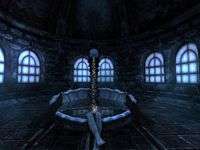 |
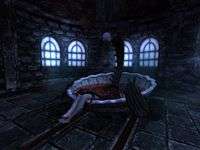 |
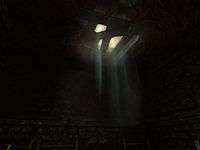 |
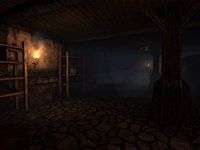 |
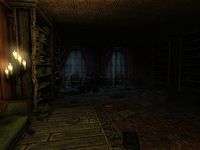 |
As you progress, it will become apparent that Daniel is not alone. Grotesque monsters stalk the corridors and depths of Brennenburg, and aside from the handful of scripted encounters, most are random, meaning that you never know what will be around the next corner or behind a door. This is where Frictional Games took a smart gamble…you are helpless. You have no weapon, no defence, and no way to fight back. Your only hope for survival in an encounter is to run. Run and hide. As gamers, we are rarely used to having no weapon in our hands; we are used to knowing that whatever horrors a game may throw at us, we can fight back; a weapon, even a makeshift one, acts as a sort of comfort blanket. Knowing exactly what they were doing, Frictional have ripped this away, leaving us weaponless, exposed, and devastatingly vulnerable.
This simple, enlightened action instantly cranks up the fear factor from the word go as you approach every corner, door, and area with acute trepidation, the unknown suddenly so much more threatening when you can do nothing in the face of its terrors. If you’re lucky, you’ll hear a monster before you see it. I use the term lucky with a wry smile…the sound of a moaning roar echoing from the darkness around you is an instant nerve shredder. You have moments to act, because these monsters run. Faster than you. Your only hope of surviving, if they spot you, is to snuff out your lamp and leg it to find a dark corner or cupboard to hide in. If you’re trying to keep a cool head, there’s the ability to slam a door shut behind you to buy precious seconds while you find a dark room to cower in, however, when you hear the door being smashed down, all you can do is crouch, stare into the wall or cupboard interior and hope that the thing gives up. Should you be tempted to take a peek, your sanity will take a hit, increasing the monsters’ chances of finding you…they can smell your fear. A cynical part of me says that this is a smart way of protecting what may or may not be a good character model, however, I wasn’t interested in finding out, I was taking no chances and stared resolutely into the brickwork of numerous passages and corners as the ominous chase music spurred on my heartbeat.
It is the sound which truly makes this game what it is and which constitute the primary ingredients in Amnesia’s secret alchemy of terror. The game presents an auditory assault, plunging the player into an unsettling world. In the castle’s early upper levels, wind moans through damaged ceilings and windows, while water drips and odd whispers twitch at the ears. Footsteps creak on wooden floors above as dust pirouettes down; a lone piano will suddenly play a few notes, while occasionally, the discordant strains of a violin will reach out from nowhere. The suffering in the castle is almost burned into the very stonework, with sudden screams, howls of tortured animals and pleading voices helping to weave a thick tapestry of sound which is largely responsible for the game’s all encompassing atmosphere of fear. Indeed, the developers are keen to reiterate that the game is best played with headphones if no surround sound is available and I’d echo this sentiment, as unsettling as it may sound. The level of immersion in the game is very dependant on the audio, so to ignore this would be to lose out on the intended experience and rob yourself of a key element of the game, not to mention the ability to actually progress. Sound is key to, not only the suffocating atmosphere of dread but, also solving some of its puzzles, which are dependant on paying close attention to the audio. Not only that, most players will want to know which direction that incoming monster is lurching from.
 A smart physics engine means that, rather than clicking on objects or doors, you directly interact with them, pulling back on the cursor to open a door or to slam it shut. Drawers and cupboards can also be either yanked or eased open, depending on the ferocity of your actions, making for a very natural and intuitive form of control. The puzzles are another success, steering away from classic adventure territory and into a whole new level. To the relief of, I imagine, many, there is not a sliding puzzle or faffy, illogical inventory based scenario to be found. Thanks to Amnesia’s smart controls, the game is very much physical and instinctive and the majority of puzzles offer a welcome breath of realism. After all, in reality, would you combine half a dozen unlikely inventory items to form a rudimentary lever with which to lower a stuck bridge? No, you’d lob a rock at it. That is how you approach the puzzles in Amnesia – instinct.
A smart physics engine means that, rather than clicking on objects or doors, you directly interact with them, pulling back on the cursor to open a door or to slam it shut. Drawers and cupboards can also be either yanked or eased open, depending on the ferocity of your actions, making for a very natural and intuitive form of control. The puzzles are another success, steering away from classic adventure territory and into a whole new level. To the relief of, I imagine, many, there is not a sliding puzzle or faffy, illogical inventory based scenario to be found. Thanks to Amnesia’s smart controls, the game is very much physical and instinctive and the majority of puzzles offer a welcome breath of realism. After all, in reality, would you combine half a dozen unlikely inventory items to form a rudimentary lever with which to lower a stuck bridge? No, you’d lob a rock at it. That is how you approach the puzzles in Amnesia – instinct.
If you’re stuck, stop thinking like a traditional adventure gamer and start thinking about how you would actually solve it in real life. Practical, physical, and entirely logical – yes, puzzles may be simpler, but the solution won’t always be something that the player will first consider because we aren’t conditioned to play like this. Although there are, of course, limits, some of the things that are possible did great favours to the game’s level of realism. When I discovered a door slipping back down after I had opened it, my instinct was to try and drag a crate underneath to stop it, so I did and, to my satisfaction, it worked. Thankfully, when puzzle solving, the game will never force you into massive backtracking and won’t dead end you by allowing you to exit an area or trigger a scripted encounter before you have everything that you may need for the future.
Aside from the puzzles, the game’s difficulty appears to adjust itself when dealing with death. Death is not final, as the manual points out, but something in the world will change. In my experience, this thankfully meant that when I was repeatedly killed, I was given a longer time to act before whatever was responsible spawned the next time, especially in the case of the famous water monster. This helps relieve some frustration, especially since, at times, the physical nature of the actions can be tricky to get used to and pull off quickly. Try dragging rocks and debris from a blocked door while being chased and see how far your trembling hands and boiling adrenalin get you.
The castle actually changes around the player as they progress, with a pursuing shadow slowly smothering the passages and chambers with a pulsing red organic matter. It also ensures that you keep moving onward and is actually a good way of making sure that the player can’t double back and become lost.
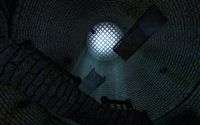 |
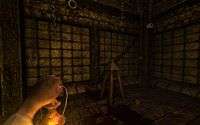 |
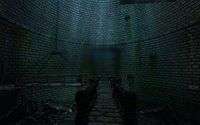 |
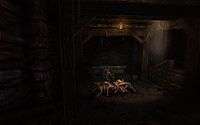 |
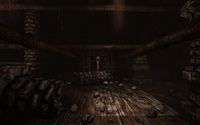 |
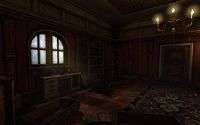 |
Amnesia’s visuals are almost as impressive as the sound, with Castle Brennenburg’s interiors painted with a rich and detailed palette. From study and storage rooms full of furnishings, old books, and shelves of jars and junk to dank corridors and repugnant prison cells with dangling manacles and blood-stained bricks. The game boasts some truly stunning locations, such as the grand back-hall where light spills in from grand windows over a grotesque fountain. Other, far grimmer places such as the Transcept and various, gruesome, torture rooms are no less impressively presented. Intricate details fill the locations and passages, from heaps of rocks and dangling chains, to abandoned tools, stacks of crates, and general detritus which fills up the space, infusing the whole place with a realistic, lived-in feel.
The visual touches are also effective in both immersing the player and heightening the level of dread: blood stains on walls, human remains, smashed doors, and, the last thing you want to see – occasional bloody handprints preceding a large drag-stain of blood on the floor, leading to a closed door. A door that you are, inevitably, about to open. As the game progresses, the locations become steadily more unsettling but the game never shies away from unpleasant details, whether it is naked copses, torture chambers, or the truly unsettling bloody scratch marks on the walls of the cells where helpless souls have tried to claw their way out.
It seems that Frictional have used every tool and trick at their disposal to create clinging atmosphere of genuine fear. Hearing a door being smashed down behind you is a terrifying experience, hiding in a cupboard while something crashes around the room you vacated seconds before, will make you shake. Even a seemingly innocuous area such as a wine cellar can instil fear and when I eventually reached a door later in the game and read the label – Morgue, I honestly nearly gave up in tears. After being terrified in a simple Wine Cellar and an archive, this was a door that I dreaded opening; full credit to the game for generating that level of genuine, dejected dread. The water monster section, which, I believe, is part of the demo, was a truly inspired segment – being stalked by a creature that is only visible by its footsteps in a waterlogged passage has to be one of the Amnesia’s top moments.
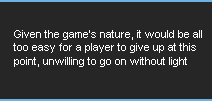 I have never played a game which made my hands tremble or set my heart racing so quickly. I have never played a game that I could only play for short bursts because the tense atmosphere was so overwhelming. I have never played a game that I’ve dreaded jumping back into after a break…not because it is bad, but rather that I know that my stomach will be knotting as soon as I hear even the ominous title screen music.
I have never played a game which made my hands tremble or set my heart racing so quickly. I have never played a game that I could only play for short bursts because the tense atmosphere was so overwhelming. I have never played a game that I’ve dreaded jumping back into after a break…not because it is bad, but rather that I know that my stomach will be knotting as soon as I hear even the ominous title screen music.
In a beautiful parallel to the game’s themes, Amnesia knows that the anticipation of horror is a terrifying and quite devastating weapon with which to break down the player. While a prisoner’s tortured screams filtered into a cell will turn others delirious with terror, so too does the game’s promise of a stalking shadow and a darkness filled with horrors. You don’t know what to expect, what will be lurking around the next corner, and the game sustains this nerve-shredding fear with the twisted skill of an accomplished torturer. While Amnesia is intended as a slow burn as you soak in the tension and immerse yourself, the pace undulates, paying out faster sections when you least expect them, slow cautious areas giving way to chases before offering the brief respite of larger puzzles and then plunging into another tense, terrifying location.
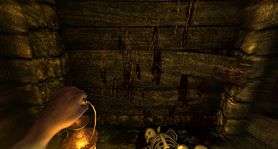 With no real, great flaws, it seems churlish, somehow, to nitpick, however, there were some issues which did present themselves. Lamp oil will burn down alarmingly fast, which, when combined with the game’s ability to get the player stuck and scratching their head, on occasion, means that you risk running out of resources, further diminishing your ability to hunt for an escape or solution and damaging Daniel’s all-too-fragile sanity. Given the game’s nature, it would be all too easy for a player to give up at this point, unwilling to go on without light.
With no real, great flaws, it seems churlish, somehow, to nitpick, however, there were some issues which did present themselves. Lamp oil will burn down alarmingly fast, which, when combined with the game’s ability to get the player stuck and scratching their head, on occasion, means that you risk running out of resources, further diminishing your ability to hunt for an escape or solution and damaging Daniel’s all-too-fragile sanity. Given the game’s nature, it would be all too easy for a player to give up at this point, unwilling to go on without light.
The story, while largely revealed in diaries, notes, and flashbacks isn’t overly complex (which isn’t an issue in itself), however, there were elements which weren’t explained or that were left unanswered. The ending I experienced (there are three) was open, yet oddly unsatisfying in a way that I can’t quite put my finger on. Whether this was due to the revelations about our, ultimately flawed and, perhaps, even unsympathetic, protagonist, or the fact that certain characters were not introduced or developed enough to have a significant impact, is a matter of conjecture.
While the majority of the locations were a perfect fit, the Choir section grated and felt a touch out of place. While it is easy to see what the developers were driving at, presenting a vast, dimly lit, foggy area to heighten the fear of getting lost and disoriented while in danger, it also inspired genuine feelings of irritation and anger as it was very easy to become lost and frustrated. Missing an important item and having to backtrack into this place wasn’t a pleasant chore, though again, this is a minor complaint and one which can be countered with the argument that these feelings are relevant to the game’s immersive web.
Complaints have been levied at the game’s length, but, to be honest, it is a non issue. It is intended as a slow burn experience, not a run and gun title. With the snail’s pace that fear and caution engender, a sense of time and length become somewhat distorted. At a guess, I would say that my play time came in at between a respectable 8 -12 hours, beating many mainstream console titles in that respect, though again, the game creates an illusion of being bigger than it is, so this depends on individual play-style and progress.
Amnesia, as unsettling as it is, is an impressive piece of work. To learn that it was developed by a five man team is nothing short of amazing, especially when you consider the calibre of the game. The way in which the sound direction and the light and dark gameplay have been used to weave a mesh of terror, which is genuinely unnerving, is nothing short of inspired. Amnesia is scary, unsettling, and truly immersive, manipulating the player’s emotions, sympathies, expectations and senses to create a title dripping with tension, atmosphere and absorbing gameplay. With a staggeringly low price-point and exceptional dedication, the small developer deserves every success with this title.
Amnesia: The Dark Descent demo can be downloaded from the follow location: http://www.amnesiagame.com/#demo
Pros- Realistic interaction and physical puzzle solving
- Stunning sound direction
- Immersive to the extreme
- Sound and visual effects create a heavy atmosphere of tension and fear
- Well paced, with an unrelenting stream of tense locations, interpersed with dynamic chases and puzzles
- Great environments and lighting
- Water monster section was inspired
- Genuinely unnerving, providing an unrelenting, scary experience
- Some unanswered questions
- Lamp oil burns down quite quickly, risking the player being too afraid to continue or unable to locate an exit or solution
- Choir location felt slightly out of place
- Some characters felt underdeveloped
This carefully woven horror adventure sucks the player into its terrifying clutches, presenting fear-drenched gameplay and a nerve-crushing atmosphere that you could slice. Innovative interaction and lovely visuals work with the outstanding sound direction to create a genuinely terrifying experience that will leave hands shaking and hearts pounding, without resorting to cheap scares. Well paced, expertly crafted, and nerve-shredding to the extreme, despite a few tiny niggles, the game is an underground hit in the making.
Last five articles by Lorna
- Flagging Heart
- Where Have All the Hours Gone?
- I Heart... Overlord
- Life Goes On: Done to Death - Review
- Welcome to Spoilerville, Please Despise Your Stay















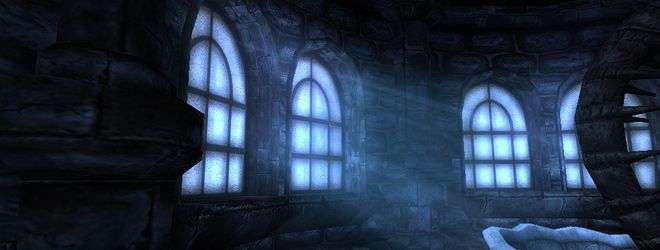
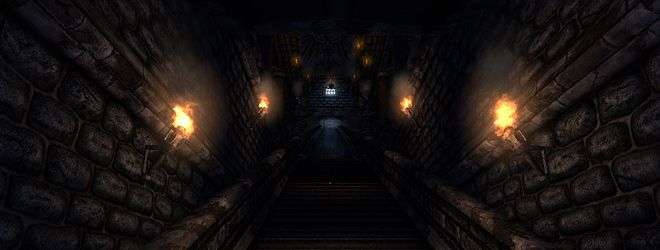
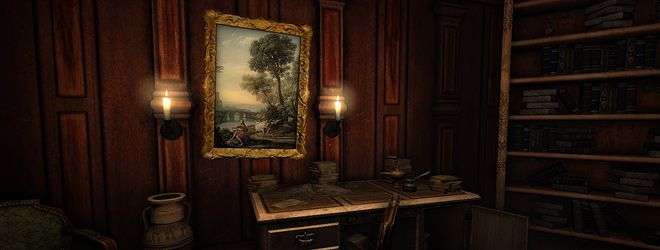
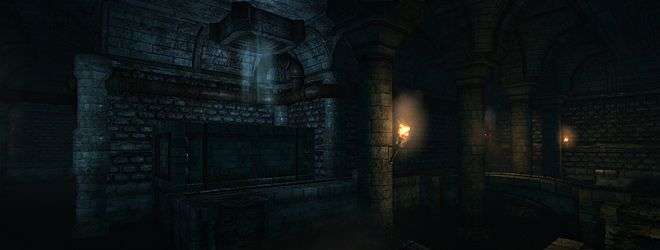






You are a braver woman than I Lorna!
I really want to play this now. Granted I’ll be shitting myself but I love the thought of running and hiding from monsters. It sounds like the direct opposite of the usual “big pecks, big guns, tiny dick” games that most companies churn out.
I don’t think my nerves could cope, not even past the install screen!
A fantastic review, but I’ll have to give the game a miss because it sounds so scary I’d probably shit myself.
I can’t do horror
I can’t WAIT to play this game! >_< Bought, downloaded, installed and awaiting my time. Roll on weekend!
Great review! I know how much you don't like horror, so well done for getting through it!
Great write up as always, Lorna. It looks like this is worth a look when I get the chance. I hadn’t heard of the game until you mentioned it on the forum, but you make a very compelling argument for at least giving it a chance. Action horror games like Resident Evil, Silent Hill, Dead Space… never do much for me. They seem to rely on being glorified shooters where the bad guys jump out suddenly at you. An intelligent horror adventure game though is a different beast entirely, and could be a lot of fun.
I really fancy playing this… I always play on a 7ft screen in complete darkness anyway with either full surround sound or the Turtle Beach headphones (although I’ve never tried them with the PC) so a game like this will be SO… VERY… IMMERSIVE and, presumably, very satisfying. Having watched the gameplay for a few minutes here and there, and heard you speak of your heart racing at certain points while your entire body trembled… there’s no way I can avoid this game. It’s near the top of my “must play” list, which I really must write down actually otherwise I’ll keep forgetting, so hopefully I’ll get to play it before the year is out.
Incredible feat for a five man team too, which really is a great achievement with most games being developed by hordes of boffins and one person doing this little bit while another does that, almost on a conveyor belt scenario. Snaps to them, and huge amounts of respect.
Thanks folks. This one is highly recommended, though I would state that it is best played with headphones on for full immersion; sound is pivotal to this game. To be honest, the price is almost ridiculously low, the devs appear to be playing a numbers game and hoping that a large volume of sales will rack up as people jump in and give it a go, undeterred by a high price point.
Oooh! This may be the first thing I play on this PC (apart from Bomb Jack on MAME).
Great write-up, Lorn.
Sounds truly intriguing.
[...] time ago, we reviewed Amnesia: The Dark Descent, a terrifying horror survival adventure, which is fast becoming a cult hit based on word of mouth [...]
I couldn’t even watch the included video all the way through, why oh why did they open the door? I will not be getting this game since the video terrified me so the actual game would probably make me sleep with the lights on for several weeks. Sounds like a great game just not for me Great article/review.
Great article/review.
[...] the best bargain we spied was the gloriously nerve-shredding Amnesia by Frictional Games. We reviewed the game waaay back, awarding it a whopping 10/10 for its excellent gameplay and soul crushingly sinister [...]
[...] and were sent a review code. Amnesia: The Dark Descent was a terrifying game, and one which we confidently predicted would become something of a hit. We were right. Hundreds of YouTube scare videos later and Amnesia has become a runaway [...]
[...] developer suddenly take off and become a huge success, and Amnesia is one of those titles. Having reviewed it way back in 2010, and predicting that it could be an underground smash in the making, we’ve [...]